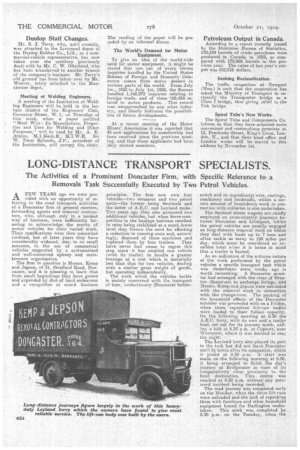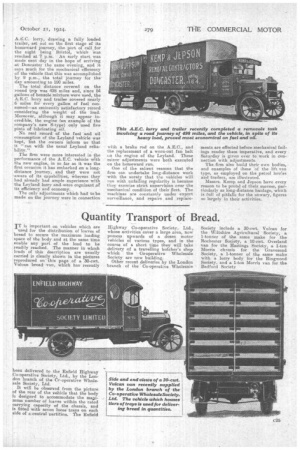LONG-DISTANCE TRANSPORT SPECIALISTS.
Page 8

Page 9

If you've noticed an error in this article please click here to report it so we can fix it.
The Activities of a Prominent Doncaster Firm, with Specific Reference to a Removals Task Successfully Executed by Two Petrol Vehicles.
FEW XEARS ago we were proi1 vided with an opportunity of referring to the road transport activities of a Doncaster firm of general carriers, forwarding agents and removal contractors, who, although only in a modest way of business, were sufficiently farseeing to acknowledge the merits of ' motor vehicles for their varied work. Their ramifications were then somewhat confined, but of later years they have considerably widened, due, in no small measure, to. the use of commercial vehicles supported by a systematized and well-conceived upkeep and maintenance organization.
The firm in question is Messrs. Kemp and Jepson, of 31, Strafford Road, Doncaster, and it is pleasing to learn that
• from small beginnings they have grown and expanded by dint of hard endeavour and a recognition of sound business
principles. The firm now own four vehicles—two steamers and two petrol units—the former being Sentinels and the latter of A.E.C. and Leyland make. Two years ago they also possessed two additional vehicles, but when fierce competition in the haulage business resulted in rates being stabilized at a much lower level they forsaw the need for effecting a reduction in running costs and, accordingly, disposed of these machines and replaced them by four trailers. They have never had cause to regret this step_ since it has enabled one vehicle (with its trailer) to handle a greater tonnage at a cost which is materially • less than that for two vehicles, dealing with a similar gross weight of goods, but operating independently. . The work which the vehicles tackle is mainly concerned with the transport of beer, confectionery (Doncaster butter scotch and its ingredients) wire, castings, machinery and foodstuffs, whilst a certain amount of breakdown work in connection with collieries is also undertaken.
The Sentinel steam wagons are chiefly employed on cross-country journeys between Doncaster and Liverpool, whilst the petrol vehicles are usually engaged on long-distance removal work on which they deal with loads up to 7 tons and often tackle as many as 150 miles per day, which -must be considered an excellent total when it is borne in mind that a trailer is hauled.
As an indication of the arduous nature of the work performed by the petrol vehicles a specific transport task which was undertaken scene weeks ago is worth recounting. A Doncaster Minister had arranged with the vicar of Drayton (Somerset) to exchange livings, and Messrs. Kemp and Jepson were entrusted with the removal work in connection with the change-over. The packing of the household effects of the Doncaster minister was proceeded with on a Friday, when three ca.paciouS lift-van bodies were loaded to their . fullest capacity. On the following morning at 8.30 the A.E.C. lorry, with its own and a trailer load, set out for its jourfiey.south, calling a halt at 6.30 p.m. at Copeutt, near Worcester, where it was decided to stay the night.
The Leyland lorry also played its part in the task but did not leave Doncaster
• until 3 hours after its companion, which it joined at 130 p.m. A start was made On the following morning at 9.30, it being arranged to finish the day's journey at Bridgwater in view of its comparatively close proximity to the final destination. This centre was reached at. 4.30 p.m. without' any untoward incident being recorded. •
The road journey was completed early on the Monday, when the three lift vans were unloaded and the task of repacking _them with furniture and other household equipment bound for Darlington undertaker. This work was completed by. 3.30 p.m. on the Tuesday, when the A.E.C. lorry, drawing a fully loaded trailer, set out on the first stage of its homeward journey, the port of call for the night being Bristol, which was reached at 7 p.m. An early start was made next day in the hope of arriving at Doncaster the same evening, and it says much for the mechanical efficiency of the vehicle that this was accomplished by 9 p.m., the total journey for the day amounting to 190 miles.
The. total distance covered on the round trip was 493 miles and, since 84 gallons of benzole mixture were used, the A.E.C. lorry and trailer covered nearly 6. miles for every gallon of fuel consumed—an eminently satisfactory record considering the weight of the load. Moreover, although it may appear incredible, the engine (an example of the company's new S-type) only used five pints of lubricating oil.
No real record of the fuel and oil consumption of the Leyland vehicle was kept, but the owners inform us that it " ran with the usual Leyland reliability."
The firm were more interested in the performance of the A.E.C. vehicle with the new engine, in so far as it was the first occasion it has embarked on a, longdistance journey, and they were not • aware of its capabilities, whereas they' had already had ample experience with the Leyland lorry and-were cognizant of its efficiency and economy. The only adjustments which had to be made on the journey were in connection with a brake rod on the A.E.C., and the replacement of a worn-out fan belt on the engine of the. Leyland. These minor adjustments were both executed on the homeward run.
One of the salient reasons that the firm can undertake long-distance work with the surety that the vehicles will run with unfailing regularity is because they exercise strict supervision over the mechanical condition of their fleet. The machines are constantly under expert surveillance, and repairs and replace
ments are effected before mechanical failings render them imperative, and every Saturday is given over to work in connection with adjustments. The firm also build their own bodies, and examples of these of the lift van type, as employed on the petrol lorries and trailers, are illustrated.
Messrs. Kemp and Jepson have every reason to he proud of their success, particularly as long-distance haulage, which is full of pitfalls for the unwary, figures so largely in their activities.






























